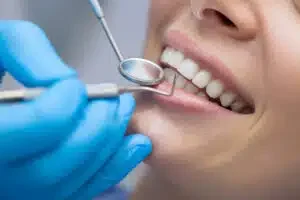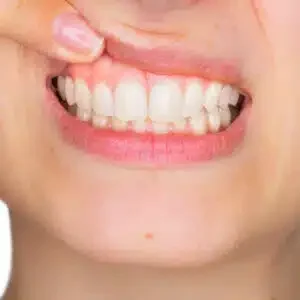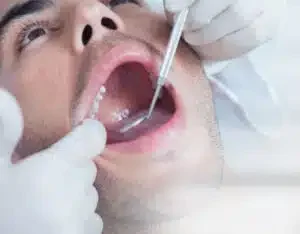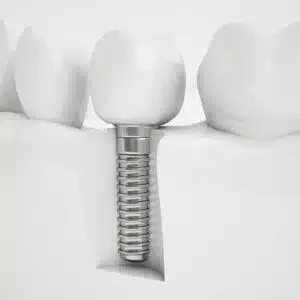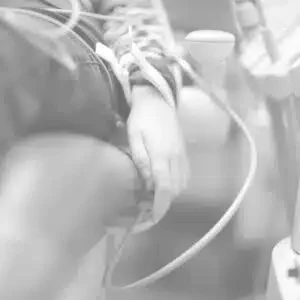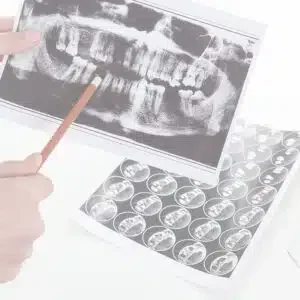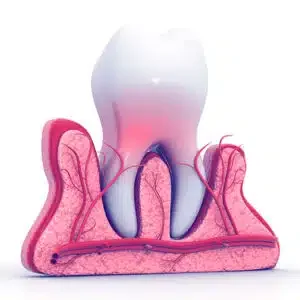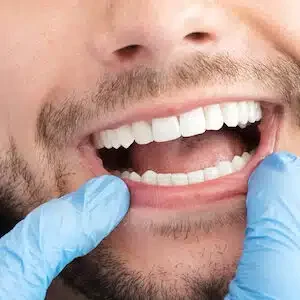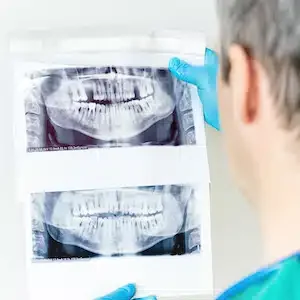IMPLANT RETAINED DENTURES
An implant retained denture is a type of overdenture that is retained by attaching to implants.
Implant Retained Dentures
What Are Implant Retained Dentures?
Implant retained dentures, also called implant supported dentures, are used when a patient is missing all of their upper teeth but has a sufficient amount of jawbone that can support dental implants. Unlike temporary dentures, these dentures are held in place by dental implants that are inserted into the jawbone. Traditional, removable dentures rest atop the gum tissues, whereas implant retained dentures attach to the dental implants that are secured by the jawbone.
Implant Dentures vs. Conventional Dentures?
To replace missing teeth Dr. Mike recommends implant-supported dentures over removable dentures that sit atop gum tissue. Implant supported dentures offer several advantages:
Longer lasting
Dental implants may last a lifetime. Implants replace a tooth’s root, which then helps to reduce/prevent jawbone shrinkage from bone loss. Patients who prefer conventional dentures, will likely continue to suffer bone loss because the root of the tooth has not been replaced.
Look more natural
Denture wearers usually like an implant-supported denture because it will look and function just like your natural teeth. Implant retained dentures and are far more stable when eating and speaking. Conventional dentures are removed and cleaned nightly. They are held in place with adhesives. In contrast, implant supported dentures are cleaned by brushing, and held in place by implants.
More hygienic
Implant supported dentures are more hygienic and comfortable when compared to conventional dentures. Removable dentures can cause gum discomfort because they are not fixed in place. Food can also become lodged beneath a denture causing discomfort. The denture needs to be removed, cleaned of food debris and then replaced. This does not occur with implant retained dentures.
Who Is Best Suited For Implant-Supported Dentures?
Implant-supported dentures are most often recommended for individuals missing all of their upper or lower teeth. Dr. Mike will conduct a full examination to determine if your jawbone can support dental implants. If the density of your bone is insufficient for an implant, Dr. Mike may recommend a bone graft procedure that will add density to your jawbone.
What Types of Implant-Retained Dentures Are Available?
There are two types of implant retained dentures: bar retained and ball retained. Both types of dentures need at least two implants to support the dentures.
Bar retained dentures
Bar retained implant supported dentures are removable dentures that are held in place by a small metal bar.. This thin metal bar is a fixed implant in the jawbone. The denture can clip onto the bar, providing more security than a conventional denture.
Ball retained dentures
Ball retained implant supported dentures use sockets that fit onto ball-shaped connectors that attached to dental implants. They provide higher stability and functionality than traditional dentures, and are easier to clean. Ball retained overdentures are also used to replace only a few missing teeth.
Benefits Of Implant Retained Dentures
Implant retained dentures offer several benefits over traditional dentures. Here are some of the advantages of implant supported dentures:
Improved stability
Implant supported dentures are anchored to dental implants that are surgically placed in the jawbone. This provides a more stable and secure fit. They do not slip like traditional dentures can.
Prevent bone loss
The dental implants in implant supported dentures mimic natural teeth roots and stimulate the nerves in the jawbone. As such, further bone loss is reduced. A traditional denture does not help to prevent bone loss.
Natural look
They are designed to look like natural adult teeth, providing a more aesthetically pleasing appearance than traditional dentures. They can also improve speech and chewing ability.
Oral health
Implant retained dentures can help restore oral health, function, and appearance by replacing missing teeth and preventing bone loss.
Long-lasting
With proper care and maintenance, implant supported dentures can last a long time, often more than 20 years.
Procedure Details
The process of placing implant related dentures involves multiple steps, which can vary depending on the specific situation of each patient. The initial consultation with Dr. Mike will be very informative. He will review the general steps involved in the procedure:
Examination and planning
The first step involves a thorough examination and consultation with Dr. Mike to determine if implant retained dentures are a suitable option for your. He will take X-rays and impressions of the mouth to create a treatment plan tailored to your specific needs.
Dental implant placement
Once the jawbone is prepared, the dental implants are surgically placed into the bone. Depending on the number of implants required, the procedure can take several hours.
Bone growth and healing
After the implants are placed, the bone is allowed time to heal and grow around the implants. This may take several months. This process is called osseointegration and is crucial for the implants to properly fuse with the jawbone to provide a stable foundation for the dentures.
Abutment placement
Once the bone has healed, abutments are placed on the implants. Abutments are small posts that protrude from the implants and provide a connection point for the dentures.
Artificial tooth placement
Finally, the artificial teeth or dentures are attached to the abutments. The dentures are custom-made to fit your mouth and to look and function like natural teeth.
What Is The Recovery Time?
The recovery time for entire arch implant supported denture surgery can vary depending on the patient’s individual circumstances. Here are some general guidelines for recovery time after implant retained denture surgery:
Healing time
After the surgery is completed, it typically takes between three and six months for the implants to fully heal and integrate with the jawbone. This healing period is important for ensuring the stability and success of the implants before the dentures are attached.
Abutment and artificial tooth placement
Once the healing period is complete, abutments are placed on the implants, and artificial teeth or final denture are attached. It can take up to two weeks for the gums to heal before the artificial teeth can be attached.
Recovery diet
Following the implant surgery, it is important to follow a recovery diet that consists mostly of soft foods for at least three days. Examples of soft foods include smoothies, creamy soups, and yogurts. This can help to reduce discomfort and promote healing.
How Do You Take Care Of Implant Retained Dentures?
The cleaning process for implant supported dentures requires daily maintenance. Both removable and fixed dentures need to be cleaned twice daily to keep them in good condition. For removable dentures, they should be removed, and detachable components should be cleaned thoroughly, including the gum areas and artificial teeth. Denture cleaning solutions can be used to soak the denture overnight to keep them moist and pliable. Never use hot or boiling water, as it can warp the denture. For fixed dentures, a soft-bristled toothbrush and non-abrasive toothpaste should be used to brush around the components, gum areas, and artificial teeth. It is not recommended to sleep with dentures in the mouth.


